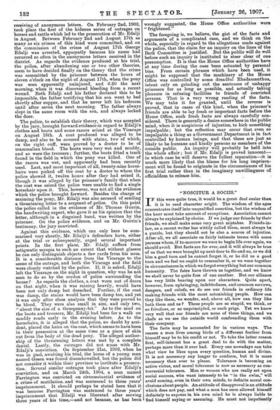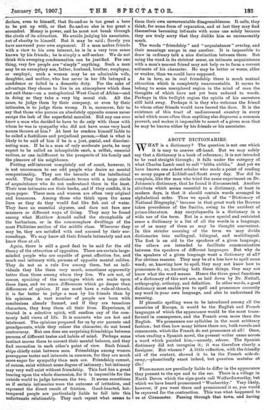"NOSCITUR A SOCHS."
IF this were quite true, it would be a great deal easier than it is to read character aright. The wisdom of the ages concentrates itself into unqualified assertion, but the wisdom of the hour must take account of exceptions. Association cannot always be explained by choice. If we judge our friends by their friends, we shall make some very great mistakes. Friends-in- law, as a recent writer has wittily called them, must always be a puzzle, but they should not be also a source of injustice. After all, we all associate on fairly intimate terms with some persons whom, if to-morrow we were to begin life over again, we should avoid. But facts are for ever, and it will always be true of us that we were brought up next door to So-and-so, or we did him a good turn and he cannot forget it, or he did 1113 a good turn and we feel we ought to remember it, or we were together in circumstances in which we forgot everything but our common humanity. The fates have thrown us together, and we know we shall never be quite free of one another. But our alliance has very little bearing upon our characters. Quite apart, however, from upbringing, indebtedness, and common sorrows, dangers, and reliefs, we do see our friends in ordinary life making friends with the most astonishina. people. How can they like them, we wonder, and, above all, how can they like both them and us ? These people are so stupid, we think, or so frivolous, or so unprincipled, or such prigs. Yet we know very well that our friends are none of these things, and we chafe as we see the outside world confounding them with their company.
The facts may be accounted for in various ways. The reason a man lives among birds of a different feather from himself may be to his credit or not. To take the latter reason first, self-interest has a great deal to do with the matter, perhaps more than it ever had. Every one nowadays can take what view he likes upon every question, human and divine. It is not necessary any longer to conform, but it is more necessary than ever to please. Tolerance is becoming an active virtue, and moral tolerance is now as necessary as con- troversial tolerance. Hen or women who are really set upon social success, who want intensely to be "in the swim," will avoid coming, even in their own minds, to definite moral con- clusions about people. An attitude of disapproval is an attitude which does not pay, and what a man has once allowed himself definitely to express in his own mind he is always liable to find himself saying or assuming. He must not impatiently
declare, even to himself, that So-and-so is too great a bore to be put up with, or that So-and-so else is too great a • scoundrel. Money is power, and he must not break through the circle of its attraction. He avoids judging his associates, out of charity to himself. Put it may be said: Surely you have answered your own argument. If a man makes friends with a view to his own interest, he is in a very true sense known by his friends ; he is simply a self-seeker. We do not think this sweeping condemnation can be justified. For one • thing, very few people are "simply" anything. Such a man may be an exemplary son, father, husband, brother, employer, or employe; such a woman may be an admirable wife, daughter, and mother, who has never in her life betrayed a confidence or failed in a domestic duty. For the sake of advantage they choose to live in an atmosphere which does not suit them—on a metaphorical West Coast of Africa—and in doing so they take a very big moral risk. All the same, to judge them by their company, or even by their intimates, is to judge them wrong. It is, moreover, fair to say that those who pursue an absolutely opposite coarse never escape the lash of the superficial moralist. Did any one ever know a man who decided to have to do only with those with whom he was in sympathy who did not have some very hard.
• names thrown at him ? At best he renders himself liable to be called a fastidious and prejudiced person,—that is what is likely to be said of him if he is a just, genial, and discrimi- nating man. If he is a man of only moderate parts, be may expect to be called an inhospitable snob, a selfish, unsocial recluse, or one indifferent to the prospects of his family and the pleasure of his neighbours.
Putting self-interest completely out of court, however, it is not uncommon to see odd people who desire no mental companionship. They are the hermits of the intellectual world. They live on affectionate terms with a large circle of acquaintance who do not understand them in the least. Their true intimates are their books, and if they confide, it is upon paper. These men and women are often very original and humorous. Among those who think upon the same lines as they do they would feel like fish out of water. They have an essential shyness, and dare not face new manners or different ways of living. They may be found among what Matthew Arnold called the strongholds of the barbarians, or in the commonplace dwellings of the most Philistine section of the middle class. Wherever they may be, they are satisfied with and amused by their sur- roundings. We may know all their friends intimately and not know them at all.
Again, there is still a good deal to be said for the old theory of the attraction of opposites. There are certain large. minded people who are capable of great affection for, and much real intimacy with, persons of opposite mental calibre. They do not as a rule live among them, but as indi- viduals they like them very much, sometimeS apparently better than those among whom they live. We are not, of course, speaking of the marriages which are made upon these lines, and we mean differences which go deeper than differences of opinion. If one must have a rule-of-thumb, it is far better to judge a man by his friends than by his opinions A vast number of people are born with conclusions already formed, and if they are tenacious char acter& they keep them all their lives. Experience, if treated in a selective spirit, will confirm any of the com- Monty held views of life. It is converts who are hot and intolerant. The opinions prepared for us by our parents and grandparents, while they colour the character, do not breed controversy. But one does see surprising friendships between persons of different tastes and habits of mind. Perhaps some instinct moves them to correct their mental balance, and they find recreation in each other's point of view. Snell friend- ships chiefly exist between men. Friendships among women presuppose tastes and interests in common, for they are much more eager for sympathy than men are. Friendship cannot, of course, exist without some degree of intimacy; but intimacy may very well exist without friendship. This fact has a great bearing upon the whole discussion, for it is impossible for the outside world to judge between the two. It seems sometimes as if certain intimacies were the outcome of irritation, and represent the direct result of friction. Good-hearted, hot- tempered people are particularly liable to fall into thia unfortunate relationship. They each repent what seems to
them their own unwarrantable disagreeableness. It calls, they think, for some form of reparation, and at last they may find themselves becoming intimate with some one solely because they are truly sorry that they dislike him so unreasonably much.
The words " friendship " and " acquaintance " overlap, and their meanings merge in one another. This impossible to draw in ordinary talk a nice distinction between them. But using the word in its strictest sense, an intimate acquaintance with a man's nearest friend may not help us to form a correct estimate of his character. He may be better or worse, abler or weaker, than we could have supposed.
As in love, so in real friendship there is much mutual attraction which is completely unaccountable. It seems to belong to some unexplored region in the mind of man the thoughts of which have not yet been reduced to words. Perhaps in this twilight region the spirits of his ancestors still hold sway. Perhaps it is they who welcome the friend to whom other friends would have barred the door. It is the existence of this tract of undiscovered country in every mind which more often than anything else disproves a common proverb, and makes it impossible to assert of a given man that he may be known either by his friends or his associates.























































 Previous page
Previous page